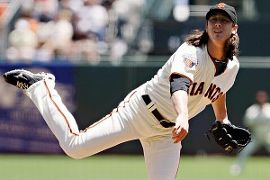|
Long before Charlie Sheen ruined the word, most fantasy owners had already grown tired of starting pitchers being measured in terms of the one category that they had the least control over: winning. Too many other factors go into whether a pitcher ultimately ends up with a W at the end of his pitching day, not the least of which is whether his lineup can score enough to make the starter's efforts bear fruit.  For instance, is it really Tim Lincecum's fault that he went 0-5 with two no-decisions in the seven games that he left with the Giants trailing by just one run? No more than Yovani Gallardo should be praised for going 3-1 in the four games he left with his Brewers in the same situation. By way of answering the question "Which pitcher would you rather have on the mound for one start?", the fact that Lincecum more often left his team at least in a position to win should hold far more weight than the 149-point edge (from .630 to .481) Gallardo had in terms of winning percentage. All that brings us to the new stat I've created in an attempt to figure out which pitchers did the most in terms of keeping their team in the game, relative to the average amount of run support they got from their team when they took the mound. It's called ownership, and it shows the percentage of a pitcher's win total we can estimate that each pitcher earned "on his own." In order to find this number, we've taken the run support that each starter received on the days he pitched and subtracted the average number of earned runs he gave up per start. Then we've adjusted that number by a factor determined by the frequency of that pitcher's ability to throw a quality start. That number gives us what I am calling a pitcher's "win help," or rather the number of wins that came as a result of the team's lineup and through nothing the pitcher could control. The ownership stat reflects the percentage of a pitcher's win total that would likely have remained if this extra help was taken away. In other words, the higher the ownership, the more often a pitcher "did enough to win."
Here is a list of the highest ownership numbers from 2011, among pitchers with at least 162 innings pitched. Most of the names should come as no shock, but there are a few surprises: You'll notice the impact of the pitiful Seattle Mariners and their microscopic run support. Felix Hernandez would likely be on this list regardless of the team he played for. Jason Vargas, on the other hand, did all he could and still managed only 10 wins. If his run support remains the same, that's the most we can likely expect from him in the future. However, given a pitcher's consistent ownership level, a boost in run support is certainly something that can change a pitcher's fortune immediately. Evidence of that can be found in Doug Fister's transformation from a 3-12 pitcher to an ace-like 8-1 after he went to Detroit and saw an increase of nearly four runs per game from his bats. Looking forward, we can easily see Michael Pineda's value soaring thanks a trade to the New York Yankees. Just check out his numbers from last season, when he was also suffering from a certain case of Seattle lumber slumber. With just one extra run per game, and giving him the same ownership level, he would have been expected to win four more games. Going to New York should easily take his 2012 projection from an average 11 wins to the 15-win neighborhood, even if his statistics also take a bit of a hit because he'll be pitching in a hitter-friendly stadium. Rounding out our brief overview of ownership: We'll provide you with a list of pitchers to be wary of for the upcoming season, especially if you believe that their lineups won't be able to provide them with the same assistance this year. For example, trouble is definitely brewing for Milwaukee's staff with no Prince Fielder and two months without Ryan Braun. Also, a new home for Gio Gonzalez in a less-friendly pitcher's park with a potentially lower-scoring lineup might spell disaster for the new National. No pitcher is going to be able to win if his team is shut out on a regular basis, but those who take the most ownership of their outings are certainly going to make the most lemonade out of the lemons that come their way. AJ Mass is a fantasy baseball, football and college basketball analyst for ESPN.com. His book "How Fantasy Sports Explains the World" is available for purchase here.You can e-mail him here. Follow AJ Mass on Twitter: @AJMass
|

